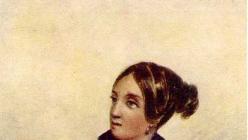Peasant poetry. This is the customary name for one of the trends in Russian literature. The movement telling about the difficult life of peasants, beauty and modesty flourished in the eighteenth and nineteenth centuries of the last century. Prominent representatives of peasant poetry are such poets as Sergei Aleksandrovich Yesenin, Nikolai Alekseevich Nekrasov, Ivan Zakharovich Surikov and many other wonderful authors.
The creative heritage of Ivan Zakharovich Surikov
The poetry of Ivan Surikov, according to critics, is original. It has its own characteristics, thanks to which the author’s creations remain in the reader’s memory for a long time, and sometimes for a lifetime. The amazing simplicity of the style, melody and extraordinary brightness of the images can captivate anyone who has at least once read the poems of this poet. Proof of such a statement can be an analysis of Surikov’s poem “Winter” and many of his other creations.
Despite the fact that the list of works written by the poet and included in the circle of interests of modern readers is not so large, the name of this wonderful master of words is known to many.
The works of Ivan Zakharovich are included in the literary reading program for primary and secondary schools. Surikov's poem "Winter", as well as "Childhood", "In the Night", "In the Steppe", "Morning in the Village", "Autumn" and many others are easy to learn by heart. The work "Rowan" ("Why are you standing, swinging...") was set to music, and many, by the way, consider this song to be a folk song. It is still heard today by professional singers, actors and just singing lovers. This fact speaks of unconditional recognition of the poet’s talent.
Landscape lyrics
In the list of works written by the poet, an important place is occupied by those that belong to the category of landscape lyrics. For example, this is the case with Surikov’s poem “Winter”.

Until the end of his days, Ivan Zakharovich never ceased to admire the beauty and perfection of the world around him. He knew how to see magic in the most ordinary and familiar natural phenomena. However, in his poems he was able to talk about this simply and naturally, which speaks of the great talent of the writer, as well as his boundless love for his native Russian nature, the people of Russia.
Description of snowfall. Ivan Surikov, "Winter"
The verse belongs to the category of landscape lyrics. The first two stanzas describe falling snow that gently covers the ground. A white blanket not only makes the world unusually elegant - it can protect all living things from the upcoming severe frosts. This is the philosophical meaning of the poem. The words of the lyrical work exude calm and tranquility. At the same time, the reader anticipates the onset of the holiday, which will certainly come in nature with the arrival of winter.
Reading the description of the snowfall, a person involuntarily begins to feel himself in the environment conveyed in the poems. This is another feature of the works of Ivan Zakharovich Surikov.
Meeting winter
When analyzing Surikov's poem "Winter", it is necessary to pay attention to how the poet describes the arrival of the harsh season. He does it masterfully - laconically, but very brightly.

The field, forest and all surrounding nature adapt to short winter days, long evenings, dark nights, and the onset of cold weather. And again, the poet points out that all changes in the life of the environment must be perceived with calmness, rejoicing at even the most insignificant phenomena that occur in this world.
Peasant life
Surikov’s “Winter” cannot be fully carried out without paying attention to the description. From the way the poet does this, it becomes clear that he is very familiar and close to the life of the common people. From the poet's biography it is known that he comes from peasants.
For rural residents, it is very important to provide themselves with a warm, reliable home and stock up on food before the onset of winter. A sufficient amount of feed prepared for livestock also gives hope for the comfortable existence of a peasant family during severe cold weather.
This is a period of relative peace in the life of the peasants. This is evidenced by the analysis of the verse “Winter”. Surikov shows that workers have time to run a poor household. Men are preparing for the upcoming sowing season, women are doing needlework. Children indulge in winter fun with all their hearts.
An analysis of Surikov’s poem “Winter” makes it possible to assume that rural residents, like the poet himself, are not devoid of romance. They do not ignore the beauty that can be observed in nature with the arrival of winter.

True connoisseurs and those who are getting acquainted with his works for the first time are happy to immerse themselves in the world described by the author. I want to reread the poet’s poems again and again, each time discovering something new for myself in the lines.
Ivan Zakharovich Surikov (March 25, 1841) - April 24, 1880) - Russian self-taught poet, representative of the “peasant” trend in Russian literature. Author of the textbook poem "Childhood". Another of his poems, “In the Steppe,” in folk adaptation became the most popular song “Steppe and steppe all around.” Based on his poems, P. I. Tchaikovsky wrote the romance “I was in the field and not a grass was there.”

Winter
White snow, fluffy
Spinning in the air
And the ground is quiet
Falls, lies down.
And in the morning snow
The field turned white
Like a veil
Everything dressed him.
Dark forest with a hat
Covered up weird
And fell asleep under her
Strong, unstoppable...
God's days are short
The sun shines little
Here come the frosts -
And winter has come.
Laborer-peasant
He pulled out the sleigh,
Snowy mountains
The kids are building.
I've been a peasant for a long time
I was waiting for winter and cold,
And a hut with straw
He covered outside.
So that the wind blows into the hut
Didn't get through the cracks
They wouldn't blow snow
Blizzards and blizzards.
He is now at peace -
Everything is covered all around,
And he's not afraid
Angry frost, angry.
In Russian literature of the 19th and 20th centuries, there is such a direction as peasant poetry, the prominent representatives of which are Sergei Yesenin and Nikolai Nekrasov. Among the authors who glorified rural life in their works is Ivan Surikov, whose name has been undeservedly forgotten these days. The creative heritage of this poet, who was born into the family of a serf peasant, is small, but many of his works are still heard by readers, as they are distinguished by the simplicity of their style, special melody and amazing brightness of images.
Among them, it is worth noting the poem “Winter,” written in 1880, shortly before the death of Surikov, who died in poverty, but until the very last moment he did not lose the ability to admire the world around him and found it perfect even despite what fate did not show to this author special favor. However, the poet never complained about life and was convinced that he had a lucky lot - to be a poet.
The poem “Winter” belongs to the category of landscape lyrics, and its first lines are dedicated to snowfall, which covers the earth with a white and fluffy blanket, transforming the world, making it cleaner and brighter. These lines emanate calm and tranquility, as well as anticipation of the holiday, which is sure to come, if only because winter is coming into its own. The poet describes her arrival very simply and laconically - “here the frosts came - and winter has come.” However, this simple phrase contains the philosophical wisdom of existence, the meaning of which boils down to the fact that we all obey the laws of nature. Therefore, any changes in the world around us should be perceived with joy and enjoy every moment of life, which is filled with amazing charm for those who know how to appreciate simple human joys.
Describing the life of the peasants, the poet notes that on a sunny and frosty winter day they still have enough worries. You need to harness the sleigh and go for firewood, without which it is impossible to survive the cold. At the same time, the villager prepares for winter very thoroughly and in advance; he has long covered the outside of the hut with straw to protect his home from the cold. But in the snowy winter, children have nothing but freedom, and in almost every village “children are building snow mountains.”
Simple rural life is described in this work with restraint and unpretentiousness. The main thing for peasants is to take care of their home, stock up on firewood and food, hay for livestock and warm clothes. This time of year is quite calm for rural residents, and they have time to pay attention to their meager farming and prepare for the upcoming sowing season, on which the well-being of the whole family depends. However, winter, even for a villager, is not without romance. And Ivan Surikov, who spent most of his life in the village, never ceases to be amazed at the beauty of the “dark forest”, which overnight acquired a luxurious and lush cap of snow, white fields and short days, which are replaced by long winter evenings filled with special charm. Only a truly gifted person who knows how to appreciate beauty and selflessly loves his native nature, appreciates peasant life and has a very subtle poetic nature can write so simply and artlessly about complex things. Therefore, it is not surprising that Ivan Surikov is considered one of the brightest and most original poets of the Russian village, who was able to breathe romance into the usual way of rural life and present it in such a way that every reader would want to slide down a high snowy mountain on the outskirts of the village or wander through a sleeping forest , listening to the creaking of snowdrifts and breathing in the frosty, tart air.
White snow, fluffy
Spinning in the air
And the ground is quiet
Falls, lies down.
And in the morning snow
The field turned white
Like a veil
Everything dressed him.
Dark forest with a hat
Covered up weird
And fell asleep under her
Strong, unstoppable...
God's days are short
The sun shines little, -
Here come the frosts -
And winter has come.
Laborer-peasant
He pulled out the sleigh,
Snowy mountains
The kids are building.
I've been a peasant for a long time
I was waiting for winter and cold,
And a hut with straw
He covered outside.
So that the wind blows into the hut
Didn't get through the cracks
They wouldn't blow snow
Blizzards and blizzards.
He is now at peace -
Everything is covered all around,
And he's not afraid
Angry frost, angry.
Analysis of the poem “Winter” by Surikov
The work of Ivan Zakharovich Surikov “Winter” lyrically and sincerely describes the arrival of the snow season in the world. The lines of this poem contain both a description of the angry frost and, in contrast, the soft comfort of this time of year.
But only at first glance, this work describes only winter; in fact, it also contains reflections on the meaning of life - after all, it is completely subordinate to nature, and a description of peasant everyday life, and a feeling of complete calm and harmony with the surrounding world.
The poem was written in 1880 in the genre of landscape lyricism. The poem has eight stanzas, each containing four lines. It is written in iambic trimeter (two-syllable meter), it has cross rhyme, feminine rhyme (stress on the penultimate syllable).
The work contains many means of artistic expression: epithets (“angry”, “fluffy”, “angry”), personifications (“frosts have come”, “the forest has fallen asleep”), similes - “the field turned white, then a shroud covered it all.”
The line “here the frosts came - and winter has come” contains the idea that our whole life is subject to the laws of nature, therefore people should accept any changes in it with gratitude and great pleasure from every, even insignificant, moment. After all, then every moment of our life will be filled with charm and joy.
“The peasant has been waiting for winter and cold for a long time, and he covered the outside of the hut with straw.” When the poet writes about the life of a peasant, he notes that even on such a calm day he still has a lot of worries - he needs to pull out and harness the sleigh to go for firewood, prepare the hut for the cold by covering it outside with straw, and also have time to look after the children , who are still building snow mountains.
For most of his life, the author himself, Ivan Surikov, lived in the village, and every winter came he was fascinated by how the dark forest was completely covered with a snow cap in just one night and, as if in fact, fell asleep for the whole winter, just as in the morning the entire field It was white from the overnight snowfall, when suddenly the day became shorter and there was less and less sun. That is why he conveyed to the reader the feeling of village life with such ease.
Only a truly talented person, like Ivan Zakharovich, could write about such difficult-to-understand things in such simple words. He is rightfully considered one of the brightest, but at the same time original poets of Russian villages. It was he who was able to bring a dose of romance into the description of rural everyday life, so much so that most readers had a desire to take a walk through a sleeping winter forest, wander through a snow-covered field, listening to the crunch underfoot, build a snow mountain, enjoying the clean, refreshing air.
Universal brotherhood! Eternal peace! Cancellation of money! Equality, work. Wonderful, amazing International! The whole world is your Fatherland. From now on there is no property. If you have two cloaks, one will be taken away from you and given to the poor. They will leave you one pair of shoes, and if you need a box of matches, Centermatches will give it to you.
In 1908-1910 Ivan Vladimirovich often left Moscow. Either he had to go to St. Petersburg in connection with the transfer of the rare Egyptian collection of V.S. Golenishchev, then to Cairo for the World Archaeological Congress, and from there to Athens, to Europe to acquire casts for the museum.
On January 9, 1905, the revolution began. A peace treaty was signed with Japan, humiliating for Russia. The people, exhausted by a miserable life, rebelled. Cannon salvos sounded in the inflamed St. Petersburg air. In the cold and gloomy barracks of the Life Guards Grenadier Regiment, where Blok lived in his stepfather’s apartment, soldiers were waiting, ready to shoot at the rebellious crowd at the first order. The recent life, peaceful and free, already seemed like a theatrical scenery that could be swept away by a light breeze.



